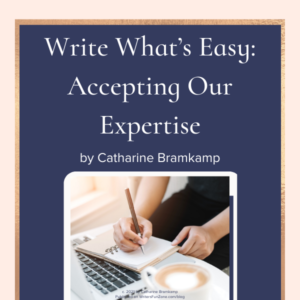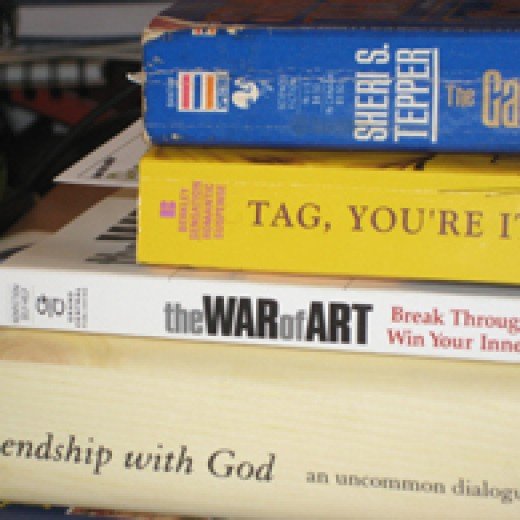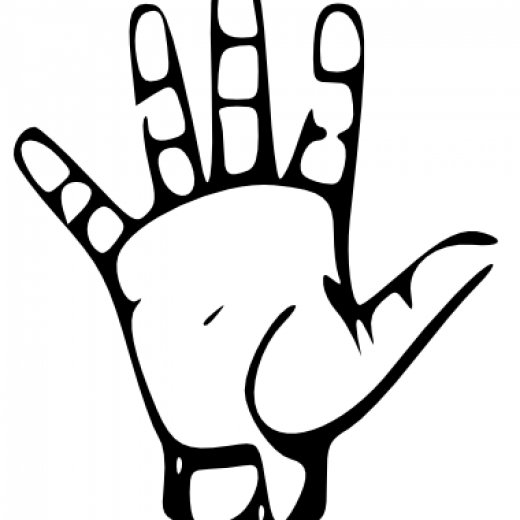Write What’s Easy: Accepting Our Expertise by Catharine Bramkamp
 Let’s welcome back monthly columnist Catharine Bramkamp as she shares with us “Write What’s Easy: Accepting Our Expertise.” Enjoy!
Let’s welcome back monthly columnist Catharine Bramkamp as she shares with us “Write What’s Easy: Accepting Our Expertise.” Enjoy!
***
Does this sound familiar?
“The road to success comes through hard work, determination and sacrifice.” Dolzinski
“The only way to the top is by persistent, intelligent, hard work.” A.T. Mercier.
“If you don’t suffer the pain of hard work now, you will suffer the pain of regret later.” Anonymous (possibly your mother).
Hard, difficult, sacrifice.
It’s a thing.
As a culture we tend to privilege difficult activities and dismiss any activity that is deemed “too easy.”
This idealization of difficulty informs our concept of work, art and writing.
We expect writing to be a struggle, we anticipate days of anguish, years of bleeding all over the page.
Because that’s how it’s done.
Conversely, when a project flows, when a novel comes to us as a full blown gift from the Muse, we cannot believe in its value, it was too easy — we almost dismiss the product because the process wasn’t grueling enough.
So how do you really know if it was easy enough?
As we become experts in our field and as the effort it takes to accomplish our work begins to smooth, the friction of effort decreases.
The work, dare we admit, becomes increasingly easy transforming from struggle to an activity we just do.
The essence of our work becomes easy.
This is not to say you didn’t learn and study your subject.
The ease manifests in how quickly you adapted to that subject and how you found it easy to help others.
When you help a friend solve a problem, you naturally and effortlessly shift into your expertise. You break down language and speak, or code and solve, or mentally calculate and deliver the correct answer.
This ability often surprises friends (bosses, co-workers, students), so much that you are likely asked to slow down and break down your answer into simple-to-follow steps.
This is the most difficult part of your own process: it’s difficult to explain.
That is why, when asked the inevitable question, how do you do it? experts often shrug and claim that for them, it’s just easy (or obvious). Easy is their singular answer because they sincerely don’t know how they arrived at the answer.
When we labor over a difficult process, invention or novel, we reasonably break the work into small concise steps. We can show our work because there is so much work to show.
But if the writing is easy, if the characters are speaking to you in their own unique language, if you are happily moving through the plot, you would be hard pressed to create the required outline or the list of character attributes.
In fact doing so will just slow you down.
So you don’t.
And when you are asked (and you will be asked) how did you write your book? How did you figure out these beautiful characters, you will have no answer at all.
You don’t know. It was easy.
Easy is not an acceptable answer.
Our readers, fans, and students want, even need, to understand the steps of the process so they can replicate them.
If you can do it, and explain it, they can copy your system and create the same best selling book.
Except those, who do something easily, make terrible instructors, they simply cannot show their work.
They default to saying — just do it. Unhelpful — their fans reply.
What does this mean for writers?
Experiment with what is easy.
This can be in the creation of not just your main work: the novel or the business book, but also for your classes, your web site offerings, lead magnets, lectures, workshops.
Consider all the moving parts of your career and identify what is easy and what is excruciatingly difficult.
By difficult I mean you dislike the project; you drag through the creation of it, you approach it warily like it’s a teeth baring tiger.
The easy projects are a pleasure, you zip through them, they represent the zone work we all love to experience. Not only that, these easy projects seem to attract more readers and more accolades.
So what is not to like?
Discover and pursue what is easy, what generates flow. Spend time in the glorious moments of complete absorption and freedom.
Relish the easy.
If you need to retrace your steps, if you need to actually explain what you do in hard tedious detail. Fine. Do that later. Maybe never.
When something is easy, instead of distrusting the process and distrusting the legitimacy of a product that was created with ease — embrace it and give it room to shine.
Just because it’s easy and arrived fully formed onto the page, doesn’t mean it isn’t brilliant.
***
Want to read more articles like this one Writer’s Fun Zone? Subscribe here.
***
ABOUT THE AUTHOR
 Catharine Bramkamp is a successful writing coach, Chief Storytelling Officer, former co-producer of Newbie Writers Podcast, and author of a dozen books including the Real Estate Diva Mysteries series, and The Future Girls series. She holds two degrees in English and is an adjunct university professor. After fracturing her wrist, she has figured out there is very little she is able to do with one hand tied behind her back.
Catharine Bramkamp is a successful writing coach, Chief Storytelling Officer, former co-producer of Newbie Writers Podcast, and author of a dozen books including the Real Estate Diva Mysteries series, and The Future Girls series. She holds two degrees in English and is an adjunct university professor. After fracturing her wrist, she has figured out there is very little she is able to do with one hand tied behind her back.
***
OTHER WFZ RESOURCES
Catharine talks about when to stop writing
https://writersfunzone.com/blog/2021/07/02/when-to-stop-writing-by-catharine-bramkamp
https://writersfunzone.com/blog/2018/07/05/writing-choose-your-weapon-by-catharine-bramkamp






